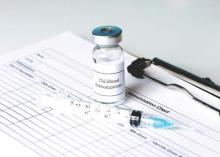Inconsistent recommendation of the HPV vaccine and discomfort discussing the HPV vaccine are common among primary care providers, likely contributing to its poor uptake, according to a recent study.
“Half of the primary care physicians in our national sample reported at least two communication practices that likely compromise their ability to meet guidelines for the routine delivery of the HPV vaccine,” reported Melissa B. Gilkey, Ph.D., of Harvard Medical School in Boston, and her associates.
“Many pediatricians and family physicians in our national sample reported recommending the HPV vaccine inconsistently, behind schedule, or without urgency,” they wrote (Cancer Epidemiol Biomarkers Prev. 2015 Oct 22. doi: 10.1158/1055-9965.EPI-15-0326).
Of 2,368 pediatricians and family physicians sent an online survey for the study, 1,022 responded and 776 met the criteria and completed the survey about provider beliefs, attitudes and behaviors surrounding HPV vaccine administration. Two-thirds (68%) of respondents were male, and more than half (55%) had at least 2 decades of practice; the group was nearly evenly split between pediatricians (53%) and family doctors (47%). Most of them (83%) saw 10 or more adolescent patients per week.
Just over a quarter (26%) did not recommend the vaccine on time – between ages 11 and 12 years – for female patients, and 39% did not recommend it on time for male patients. Well over half (59%) used a risk-based approach in recommending the HPV rather than a consistent routine recommendation. Similarly, half (49%) did not recommend the vaccine the same day. About a third (34%) anticipated uncomfortable conversations about the vaccine or about HPV as a sexually transmitted infection (32%), and 47% felt parents saw the vaccine as unimportant or only slightly important for their preteens.
A large majority of doctors (84%) felt the tone of the conversation to be at least as important as the content of what they say. They perceived greater parent receptivity to the vaccine with an informative (76%) or nonjudgmental tone (44%). Fewer doctors reported high receptivity with a concerned (23%), warm (22%), or upbeat (13%) tone.
A third of the doctors (34%) start the conversation with information, 30% start saying the child is due for the vaccine, and 29% start by suggesting the vaccine. While 99% of the doctors told patients and parents that the HPV vaccine prevents cervical cancer, 84% mentioned prevention of genital warts, and 55% mentioned preventing other cancers.
“Interventions are urgently needed to help physicians improve their HPV vaccine recommendations, and the quality indicators of timeliness, consistency, urgency and strength of endorsement offer one framework for guiding these efforts,” Dr. Gilkey and her associates wrote. “By improving how physicians recommend HPV vaccine, we can raise national coverage, thereby ensuring that today’s youth enjoy the full benefit of a potent tool for cancer prevention.”
The research was funded by Pfizer, the University of North Carolina Lineberger Comprehensive Cancer Center, and the National Cancer Institute. Dr. Brewer reports research grants from Merck, Pfizer, and GlaxoSmithKline, speaker honoraria from Merck, and consultancy for Merck.


